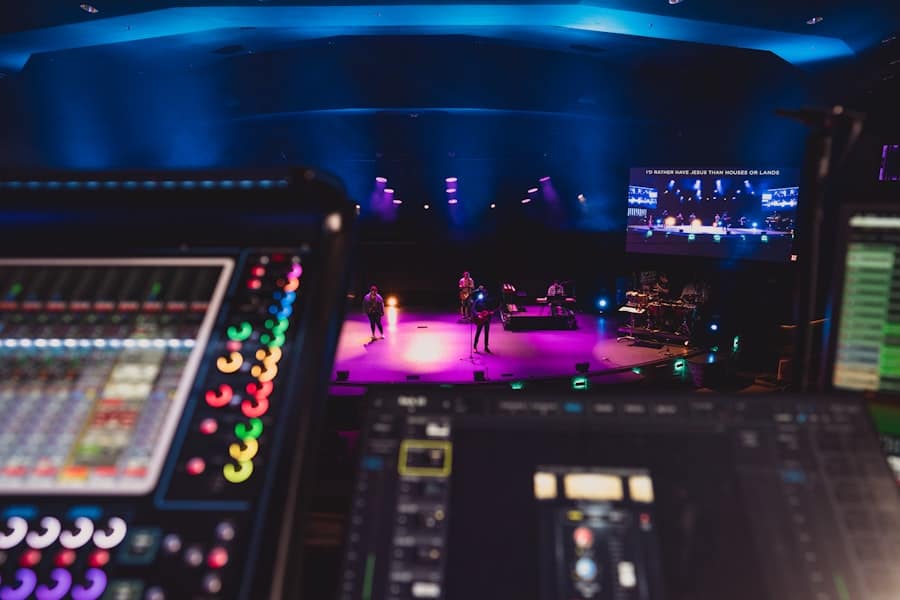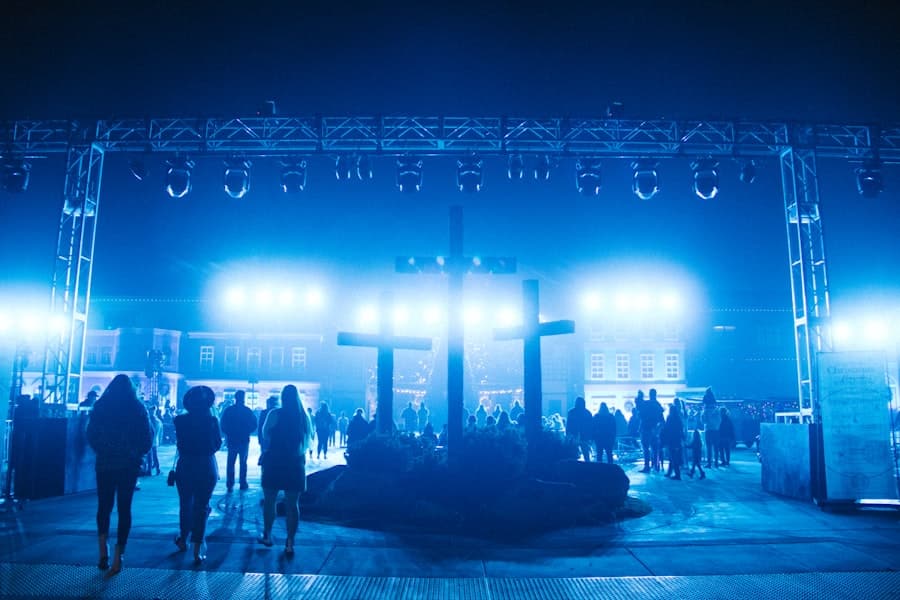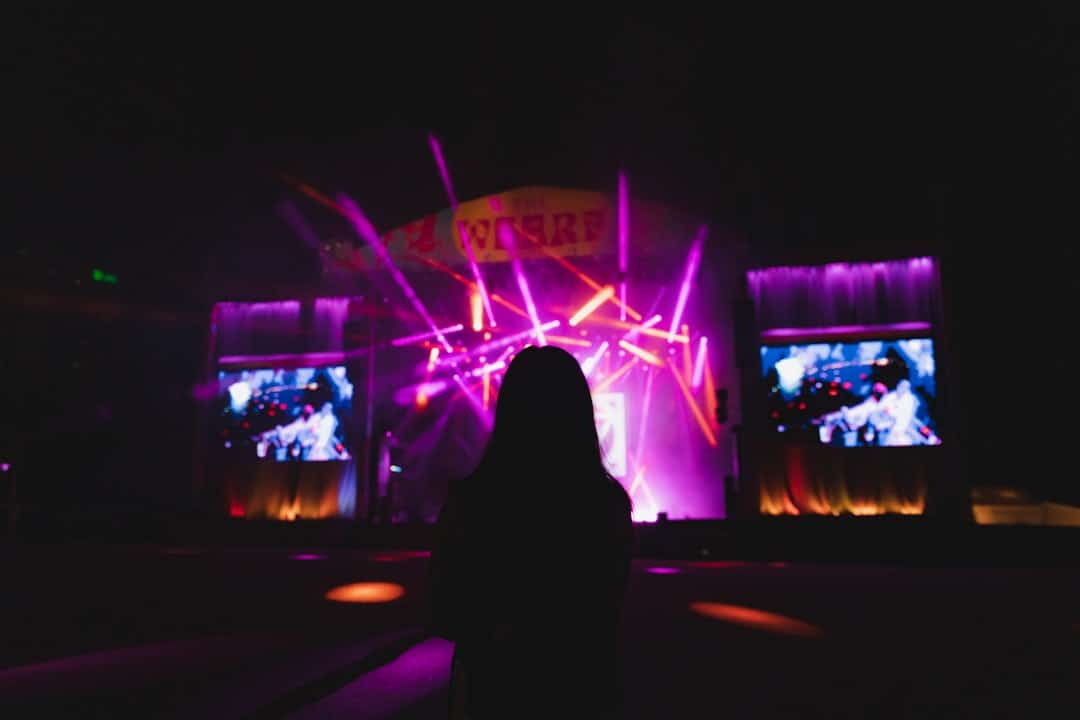The phenomenon of virtual concerts within video games has surged dramatically in recent years, marking a significant evolution in how music is experienced and consumed. This trend gained notable traction during the COVID-19 pandemic when traditional live events were curtailed, prompting artists and game developers to explore innovative avenues for engagement. One of the most iconic examples is Travis Scott’s concert in Fortnite, which attracted over 12 million concurrent players.
This event not only showcased the potential of virtual concerts but also highlighted the unique capabilities of gaming platforms to host large-scale performances that transcend geographical limitations. As technology continues to advance, the integration of music and gaming has become increasingly seamless. Platforms like Roblox and Minecraft have also hosted their own virtual concerts, featuring a range of artists from various genres.
These events are not merely about the music; they create a vibrant, interactive environment where fans can engage with their favorite artists in ways that traditional concerts cannot offer. The rise of virtual concerts in video games represents a paradigm shift in the entertainment industry, where the lines between gaming and live music are increasingly blurred, creating a new form of cultural expression.
Key Takeaways
- Virtual concerts in video games are on the rise, offering a new platform for artists to reach their fans.
- Virtual concerts provide accessibility and inclusivity for fans who may not be able to attend physical concerts.
- Fans can enjoy an immersive and interactive experience at virtual concerts, enhancing their connection with the artist.
- Virtual concerts open up potential for creative collaborations between artists and game developers, leading to unique and innovative experiences.
- There are monetization opportunities for both musicians and game developers in virtual concerts, creating a new revenue stream.
Accessibility and Inclusivity of Virtual Concerts
One of the most compelling aspects of virtual concerts in video games is their inherent accessibility. Unlike traditional concerts that often require physical attendance, which can be limited by location, ticket prices, and venue capacity, virtual concerts can be accessed by anyone with an internet connection. This democratization of music allows fans from diverse backgrounds and locations to participate in events that they might otherwise miss.
For instance, a fan living in a remote area or someone with mobility challenges can enjoy a concert experience without the barriers typically associated with live events. Moreover, virtual concerts can cater to a wider audience by offering features such as customizable avatars, interactive elements, and even sign language interpretation. This inclusivity extends to various demographics, including those who may feel marginalized in traditional concert settings.
By creating an environment where everyone can participate equally, virtual concerts foster a sense of community among fans. The ability to interact with other attendees through chat functions or in-game actions enhances this sense of belonging, making the experience more enriching for all involved.
Immersive and Interactive Experience for Fans

Virtual concerts in video games offer an immersive experience that goes beyond simply listening to music. The integration of visual effects, interactive environments, and gamified elements creates a multi-sensory experience that captivates audiences. For example, during Travis Scott’s Fortnite concert, players were not just spectators; they became part of an elaborate spectacle where the environment transformed dynamically in response to the performance.
This level of interactivity allows fans to engage with the music on a deeper level, as they can explore the virtual world while enjoying their favorite songs. Additionally, many virtual concerts incorporate gameplay mechanics that enhance the overall experience. Fans can participate in mini-games or challenges during the concert, further blurring the lines between gaming and live music.
This interactivity not only keeps audiences engaged but also encourages them to share their experiences on social media platforms, amplifying the reach of the event. The combination of immersive visuals and interactive gameplay creates a unique atmosphere that traditional concerts struggle to replicate, making virtual concerts an appealing alternative for both artists and fans.
Potential for Creative Collaborations between Artists and Game Developers
The intersection of music and gaming opens up exciting possibilities for creative collaborations between artists and game developers. These partnerships can lead to innovative experiences that push the boundaries of both industries. For instance, artists can work closely with game designers to create bespoke environments that reflect their musical style or thematic elements from their albums.
This collaboration can result in unique concert experiences that resonate deeply with fans, as they are not just passive observers but active participants in a narrative crafted by both the artist and the game developers. Moreover, these collaborations can extend beyond single events. Artists can release exclusive in-game content tied to their music, such as special skins or items that fans can use while playing.
This not only enhances the gaming experience but also provides additional revenue streams for both parties involved. The synergy between musicians and game developers fosters a creative ecosystem where both can thrive, leading to innovative projects that captivate audiences across multiple platforms.
Monetization Opportunities for Musicians and Game Developers
The rise of virtual concerts has opened up new monetization avenues for both musicians and game developers. For artists, virtual concerts can serve as a lucrative revenue stream through ticket sales, merchandise sales within the game, and even exclusive content offerings. Unlike traditional concerts where costs such as venue rental and logistics can eat into profits, virtual events often have lower overhead costs, allowing artists to retain a larger share of revenue generated from their performances.
Game developers also stand to benefit financially from these collaborations. By hosting virtual concerts within their platforms, they can attract new users and retain existing ones through engaging content. Additionally, partnerships with artists can lead to sponsorship deals and advertising opportunities that further enhance revenue potential.
The ability to monetize these events through various channels creates a win-win situation for both musicians and game developers, fostering a sustainable model for future collaborations.
Overcoming the Limitations of Physical Concerts

Virtual concerts effectively address many limitations associated with physical live performances. One significant challenge faced by traditional concerts is the unpredictability of external factors such as weather conditions or venue issues that can disrupt an event. In contrast, virtual concerts provide a controlled environment where technical difficulties can be managed more effectively.
This reliability ensures that fans have a consistent experience regardless of external circumstances. Furthermore, virtual concerts eliminate geographical constraints that often limit attendance at physical events. Fans from around the world can join in without the need for travel or accommodation expenses, making it easier for artists to reach a global audience.
This accessibility not only broadens an artist’s fan base but also allows for diverse cultural exchanges as fans from different backgrounds come together to celebrate music in a shared digital space.
The Future of Virtual Concerts in the Gaming Industry
As technology continues to evolve, the future of virtual concerts within the gaming industry appears promising. Advancements in augmented reality (AR) and virtual reality (VR) are set to enhance the immersive quality of these events even further. Imagine attending a concert where you can feel as if you are standing right next to your favorite artist on stage or interacting with other fans in a fully realized 3D environment.
Such experiences could redefine how we perceive live music and gaming. Moreover, as more artists recognize the potential of virtual concerts, we may see an increase in high-profile collaborations between musicians and major gaming franchises. This could lead to more elaborate events that incorporate storytelling elements or even tie-ins with new game releases.
The blending of narratives from both music and gaming could create rich experiences that captivate audiences on multiple levels, paving the way for a new era of entertainment that transcends traditional boundaries.
Challenges and Considerations for Virtual Concerts in Games
Despite the numerous advantages of virtual concerts in video games, several challenges must be addressed for this trend to reach its full potential. One significant concern is ensuring a stable internet connection for all participants. Lag or connectivity issues can detract from the overall experience, leading to frustration among fans who expect seamless interactions during performances.
Game developers must invest in robust infrastructure to support large-scale events while minimizing technical disruptions.
Artists must navigate complex legal frameworks to ensure their work is protected while also allowing for creative expression within virtual environments.
Striking a balance between artistic freedom and legal compliance will be crucial as more musicians venture into this space. Furthermore, there is the challenge of maintaining audience engagement over time. As virtual concerts become more commonplace, standing out from the crowd will require innovative approaches to content creation and audience interaction.
Artists and game developers must continually evolve their strategies to keep fans excited about upcoming events while ensuring that each concert feels unique and memorable. In conclusion, while virtual concerts within video games present exciting opportunities for innovation and engagement, addressing these challenges will be essential for sustaining this burgeoning trend in the entertainment landscape.
In the rapidly evolving landscape of music events, virtual concerts within video games are emerging as a groundbreaking trend, offering fans immersive and interactive experiences. This shift is part of a broader technological revolution that is opening up new possibilities across various domains. For instance, the article “com/unlock-a-new-world-of-possibilities-with-the-samsung-galaxy-chromebook/’>Unlock a New World of Possibilities with the Samsung Galaxy Chromebook” explores how advancements in technology are transforming user experiences, much like how virtual concerts are redefining the music industry.
Both articles highlight the potential of technology to create innovative and engaging experiences, whether in entertainment or everyday computing.
FAQs
What are virtual concerts in games?
Virtual concerts in games are live music events that take place within a virtual environment, such as a video game or virtual reality platform. These events feature real-life musicians performing for an audience of players who attend the concert within the game.
How do virtual concerts in games work?
Virtual concerts in games typically involve the integration of live or pre-recorded performances by musicians into the game environment. Players can attend the concert by logging into the game at a specific time and location, where they can interact with other attendees and experience the performance through their avatars.
Why are virtual concerts in games considered the future of music events?
Virtual concerts in games are seen as the future of music events due to their ability to reach a global audience, provide unique interactive experiences, and offer new revenue streams for musicians and game developers. Additionally, virtual concerts can be more accessible and inclusive for fans who may not have the opportunity to attend traditional live events.
What are some examples of virtual concerts in games?
Some examples of virtual concerts in games include events held in popular games like Fortnite, Roblox, and Minecraft. These concerts have featured performances by well-known artists such as Travis Scott, Lil Nas X, and The Weeknd, and have attracted millions of attendees from around the world.
What are the benefits of virtual concerts in games for musicians and fans?
Virtual concerts in games offer benefits for both musicians and fans. Musicians can reach a larger and more diverse audience, generate new sources of income, and experiment with innovative ways of presenting their music. Fans can enjoy immersive and interactive concert experiences, connect with other music enthusiasts, and access live performances from anywhere with an internet connection.

